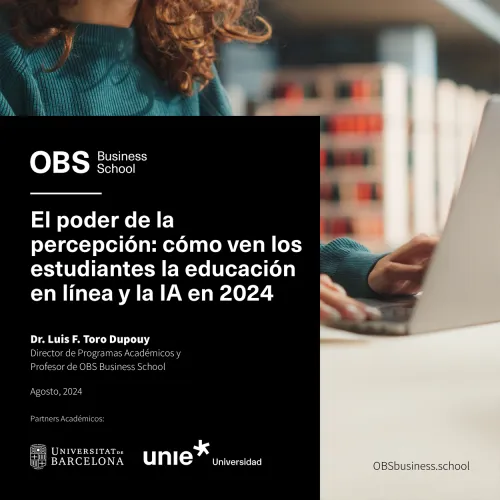
OBS Report: The power of perception, how students see online education and AI in 2024
97% of students recommend online education
- The combination of online and face-to-face learning is the most valued option.
- The convenience and flexibility of online learning are the main motivations.
- Students identify Virtual, Augmented and Mixed Reality as the technology with the greatest potential impact on learning.
- Students' enrollment decision is influenced by the reputation of the institution and the program.
September 2024. OBS Business School publishes the report The power of perception: how students see online education and AI in 2024, conducted by Luis Toro, director of academic programs at the school. This is the 9th edition of this report, which analyzes the latest trends in the field of e-learning and the perception of students and teachers about them.
Student support for online learning is already in the majority according to the OBS survey, and although among faculty this perception is growing, there are still many who prefer face-to-face or hybrid learning. However, as many as 97% of respondents, students, faculty and administrators alike, would recommend online education to others because they believe it is more efficient, among other reasons. With this mindset, it stands to reason that today's students value an institution's technology infrastructure and commitment to continuous improvement when choosing where to study. But they also base their choice on the reputation of the school, the content of the programs and the price of tuition.
Technologies in e-learning
AI is redefining how students learn today, how instructors teach, and how educational institutions operate. Those institutions that engage their students and staff in the process of adopting this technology tend to foster a positive perception. This engagement can include surveys to understand student needs, pilot programs to test new tools, and feedback mechanisms to refine AI applications. These are inclusive approaches that help position institutions as leaders in educational innovation and attract high-quality students and faculty. However, there is still a gap between the perceived ease of use of AI by students (66%) and teachers (29.4%).
We already know the many benefits of AI in the field of education (personalized learning, increased participation and optimized administrative processes), however, a successful adoption depends on the preparation of each organization, which includes not only having an adequate infrastructure but also the preparation of its teaching and administrative staff. Good organizational preparation is today a competitive advantage perceived by students
On the other hand, students' self-perception of their innovativeness is a critical factor in effectively adopting new artificial intelligence tools. Influenced by past experiences with technology, openness to new ideas, and confidence in their abilities, students who perceive themselves as innovators are more likely to interact with artificial intelligence tools, achieve better results, and inspire other peers. On the other hand, educational institutions can enhance this self-perception by providing them with opportunities for exploration, offering training, and recognizing and rewarding truly innovative behaviors.
The challenges to developing and maintaining high quality online programs are many and involve not only financial aspects, but also the resilience of institutions.
Content written by:
Carmen García-Trevijano
OBS Business School's Press Office

